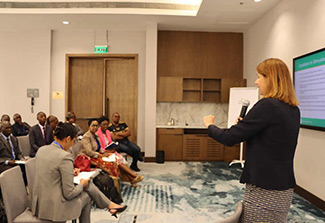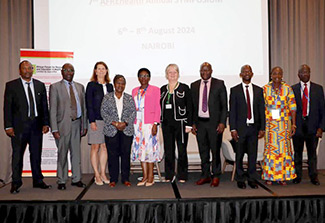Neuzil and AFREhealth symposium attendees discuss global health research
September/October 2024 | Volume 23 Number 5
 Photo courtesy of AFREhealth Fogarty Director Dr. Kathy Neuzil leads a listening session at AFREhealth’s Seventh Annual Symposium.
Photo courtesy of AFREhealth Fogarty Director Dr. Kathy Neuzil leads a listening session at AFREhealth’s Seventh Annual Symposium.
A crucial stop on Fogarty Director Dr. Kathy Neuzil’s inaugural listening tour was the
African Forum for Research and Education in Health (AFREhealth). As a new director eager to learn, Neuzil seized an opportunity to attend the organization’s 7th Annual Symposium in August to understand barriers, establish rapport, and prioritize action symposium in August. AFREhealth, which is supported by the National Institutes of Health (NIH) and the U.S. President’s Emergency Plan for AIDS Relief (PEPFAR), is an interdisciplinary society that works with ministries of health, academic and training institutions, and other stakeholders to improve the quality of health care on the continent through research, education, and capacity building.
It is African-focused and African-led.
As part of the Fogarty strategic planning process, Neuzil and Dr. UnJa Hayes, program officer for AFREhealth and other Fogarty programs, held a break-out session with AFREhealth investigators. Neuzil encouraged attendees “to share as many ideas as we can, openly and transparently.”
Hayes explained how AFREhealth was shaped from the successes of the Medical Education Partnership Initiative and the Nursing Education Partnership Initiative, earlier investments by NIH and PEPFAR to improve health care in Africa by strengthening its health and research workforce. Two years later, a Fogarty grant (in partnership with PEPFAR) funded the development of the necessary infrastructure to establish the society, which includes individuals, institutions, associations and networks from all geographic and linguistic regions of Africa plus external members. “The listening session helps us see where there may be a disconnect—what is generally understood by the community as opposed to what we think we are communicating,” said Hayes.
The wisdom of the room
As they passed the microphone, attendees briefly introduced themselves. Nearly all expressed gratitude for the role Fogarty played in their careers… and their lives. Each perspective was unique, yet common themes emerged.
An epidemiologist who works in three countries on the continent highlighted the fact that the burden of noncommunicable diseases is increasing. There are currently “no good strategies” to address delayed cancer diagnoses, he said. Nurses may not be familiar with cancer symptoms, while the referral process takes too long. “By the time the patient is diagnosed, he or she has been in the system for three, four years.” The research agenda questions are myriad, and might relate to earlier diagnosis, training methods, or development/deployment of immunotherapies. “More genetic data is what we need most of all.”
A medical doctor and tech developer asked that Fogarty “consider increasing cancer research funding streams, particularly for local innovations for managing NCDs, especially breast and colorectal cancers.” (Her own startup uses AI to screen for breast cancer.) Early career innovators like herself lack capital to conduct research to ensure product safety, she said, adding that backing by Fogarty and NIH would not only enable clinical studies but also provide access to data captured in hospitals.
Neuzil noted that such funding already exists. An NIH Common Fund program, the
Data Science for Health Discovery and Innovation in Africa (DS-I Africa) Initiative, aims to leverage data science technologies to transform biomedical and behavioral research, while contributing to the development of expertise among African scientists. Supported by Fogarty, DS-I Africa is working to create and support a pan-continental network of data scientists and technologies. The initiative currently encompasses 38 ongoing projects across Africa.
 Photo courtesy of AFREhealthNeuzil was among the presenters at the symposium
Photo courtesy of AFREhealthNeuzil was among the presenters at the symposium
Research training
Education dominated the thoughts of many attendees. Fogarty currently features a variety of training programs, including bioethics, bioinformatics, infectious diseases, HIV, and trauma and injury research. One attendee noted that research training grants usually “focus on a single disease, but we need some funding that is broad spectrum—that allows people to study various conditions.” Another commented that caring for patients with non-communicable diseases becomes an extended responsibility for most families. “In Uganda, someone who is caring for a patient with cancer often ends up with hypertension because of the stress,” she said. “Can we think of a toolkit or policy brief or training of family members to help in that area?” Neuzil and Hayes encouraged innovative research projects that address these real-world challenges.
Meanwhile, a family physician commented that she’s most “concerned about strengthening the primary health care system because that's the first point of contact that we have and that’s our engagement with the community—that’s where we need grants. What about continuity of care, comprehensiveness, coordination, person-centeredness? Perhaps there are gaps there.”
Grant management
The nuts and bolts of grant mechanisms also took center stage. A research administrator said she’s benefitted “a lot” from NIH YouTube educational videos but sees a gap “in training
us—the research managers and administrators—so that we can keep pace with dynamic research and any new requirements.” (Fogarty currently offers funding for infrastructure development training programs for HIV research to help low-and middle-income country institutions build administrative capacity.) She also wondered if Fogarty might fund more studies of African traditional medicine.
In conclusion, Neuzil said, “This has really exceeded all expectations. So many people participated and gave us great ideas. I'm grateful to you all.” Neuzil encouraged attendees to stay abreast of funding updates, at
Fogarty Funding Opportunities.
More Information
Updated March 3, 2025
To view Adobe PDF files,
download current, free accessible plug-ins from Adobe's website.
Related World Regions / Countries
Related Global Health Research Topics